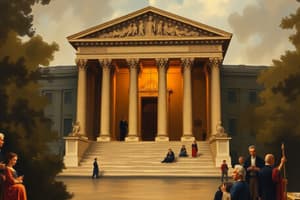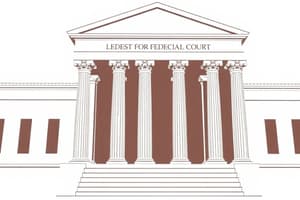Podcast
Questions and Answers
What did the Judiciary Act of 1789 establish?
What did the Judiciary Act of 1789 establish?
- The executive branch
- The lower federal courts (correct)
- The legislative branch
- The constitution
Who was Alexander Hamilton?
Who was Alexander Hamilton?
United States statesman and leader of the Federalists.
What is a cabinet in the context of the U.S. government?
What is a cabinet in the context of the U.S. government?
A body of advisers to the president composed of the heads of the executive departments.
What is the Bank of the United States?
What is the Bank of the United States?
What does Democratic-Republicans refer to?
What does Democratic-Republicans refer to?
What is meant by a two-party system?
What is meant by a two-party system?
What are protective tariffs?
What are protective tariffs?
What is an excise tax?
What is an excise tax?
What does neutrality refer to?
What does neutrality refer to?
What was Pinckney's Treaty?
What was Pinckney's Treaty?
Who was John Jay?
Who was John Jay?
What is sectionalism?
What is sectionalism?
What was the XYZ Affair?
What was the XYZ Affair?
What were the Alien and Sedition Acts?
What were the Alien and Sedition Acts?
What is nullification?
What is nullification?
Who were Lewis and Clark?
Who were Lewis and Clark?
Who was John Marshall?
Who was John Marshall?
What was the Judiciary Act of 1801?
What was the Judiciary Act of 1801?
Flashcards are hidden until you start studying
Study Notes
Judiciary Act of 1789
- Established the framework for lower federal courts in the U.S.
- Derives authority from Article III, Section 1 of the U.S. Constitution.
Alexander Hamilton
- Key figure in U.S. history; first Secretary of the Treasury.
- Leader of the Federalists; advocated for a federal banking system.
- Fatally wounded in a duel with Aaron Burr.
Cabinet
- A group of advisors to the president.
- Composed of heads of executive departments.
Bank of the United States
- Created by Congress to act as fiscal agents and depositories for federal funds.
- First bank operated from 1791-1811; second bank from 1816-1836.
Democratic-Republicans
- Major political party in early 19th century America.
- Favored strict interpretation of the Constitution and states' rights.
Two-Party System
- Political structure where two major parties dominate governance.
- One party typically holds a majority, referred to as the governing party, while the other serves as the opposition.
Protective Tariff
- Imposed to shield domestic industries from foreign competition.
- Can also raise government revenue or discourage certain activities.
Excise Tax
- Taxes applied to specific goods like gasoline, often included in product pricing.
- Applicable on activities such as gambling and heavy truck use on highways.
Neutrality
- A policy of not aligning with or supporting either side in a conflict; promotes impartiality.
Pinckney's Treaty
- Signed on October 27, 1795; also known as the Treaty of San Lorenzo.
- Established friendly relations between the United States and Spain.
John Jay
- Notable American statesman, diplomat, and Founding Father.
- Served as the first Chief Justice of the United States and played a role in the Treaty of Paris.
Sectionalism
- Focusing on narrow local interests at the expense of broader national well-being.
XYZ Affair
- A diplomatic incident that escalated to the Quasi-War between the U.S. and France.
- Resolved through the Convention of 1800, also known as the Treaty of Mortefontaine.
Alien and Sedition Acts
- Enacted in 1798, allowing for the deportation of foreigners and restrictions on immigrant voting rights.
- Aimed at quelling dissent against the Federalist government.
Nullification
- A constitutional theory asserting states' rights to invalidate federal laws deemed unconstitutional.
- Lacks legal backing in federal courts.
Lewis and Clark
- Expedition led by Meriwether Lewis and William Clark to explore the American Northwest.
- Conducted during Thomas Jefferson's presidency after the Louisiana Purchase.
John Marshall
- Chief Justice of the Supreme Court from 1801 to 1835.
- Influential in shaping U.S. constitutional law.
Judiciary Act of 1801
- Also referred to as the Midnight Judges Act.
- Established additional federal judgeships and was significant in the context of political power and judicial review.
Studying That Suits You
Use AI to generate personalized quizzes and flashcards to suit your learning preferences.




